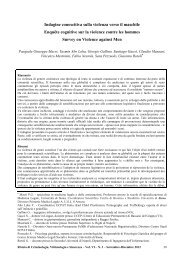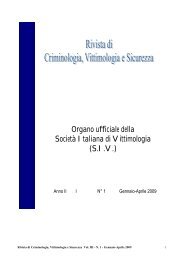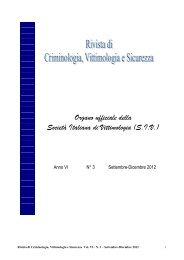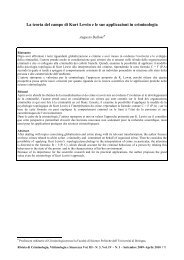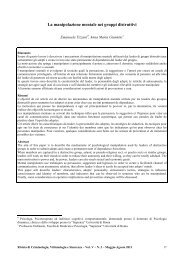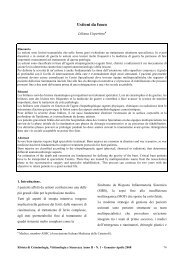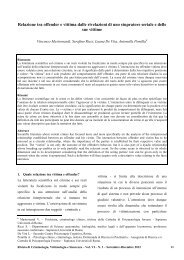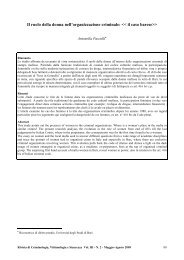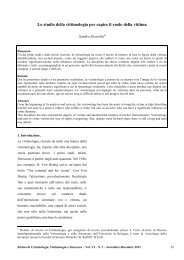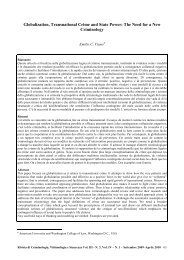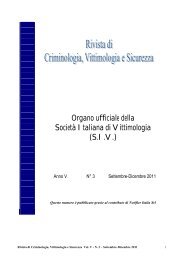Anno 2, Numero 3, Settembre-Dicembre 2008 - Vittimologia
Anno 2, Numero 3, Settembre-Dicembre 2008 - Vittimologia
Anno 2, Numero 3, Settembre-Dicembre 2008 - Vittimologia
Create successful ePaper yourself
Turn your PDF publications into a flip-book with our unique Google optimized e-Paper software.
corruption and one on economic crime under the<br />
Octopus Programme.<br />
The most influential on the Romanian criminal<br />
policy in the field was undoubtedly the one on<br />
cybercrime, as long as in a short period of time<br />
after the seminar, Romania has ratified the<br />
Council of Europe Cybercrime Convention which<br />
is at the moment the only binding instrument of<br />
this kind in the world. The seminar was also<br />
important due to its training characteristics,<br />
people among the judiciary and other law<br />
enforcement agencies being invited to get<br />
familiarised with this type of criminality very<br />
much present not only in the media and also in the<br />
public discourse of the politicians, but more and<br />
more in the caseload of the Romanian courts. The<br />
staff of the Institute also took advantage of the<br />
Council of Europe expertise as cybercrime was<br />
one of the themes that should have been<br />
approached by the Institute, as we shall see further<br />
on..<br />
Because I wanted to bring to your attention the<br />
link that was thought between the Institute and the<br />
criminal policies in the field I would continue<br />
with the example of cybercrime. Law 161/2003<br />
Title III contains specific provisions related to<br />
cybercrime. It is referring mainly to substantial<br />
law , procedural and mutual legal assistance<br />
issues, just like the Cybercrime Convention does.<br />
There is one special chapter (the second one)<br />
though entitled Cybercrime prevention. Among<br />
the institutions involved in the criminal policies<br />
related to computer crime it was mentioned also<br />
the National Institute of Criminology which had<br />
as an aim to undertake periodical surveys in order<br />
to identify the causes and conditions favouring<br />
this type of criminality. Despite that, in our four<br />
years of activity there was little done in this<br />
respect.<br />
The Institute had an attempt to analyse the legal<br />
criminality as regards cybercrime in the beginning<br />
of 2004 but it was only several months after the<br />
entrance into force of the above-mentioned law<br />
and the jurisprudence was very scarce. Then it<br />
was believed that the researchers needed a certain<br />
specialisation and some of them participated to<br />
several training programs, several under the AGIS<br />
Programs, organised by the Interpol in the United<br />
Kingdom and Ireland..<br />
There was one study though which touched to a<br />
certain extent the problem of cybercrime , that is a<br />
study referring to Electronic Evidence which was<br />
developed under an AGIS Programme with a<br />
Spanish firm called CYBEX.<br />
This short example is quite relevant as regards the<br />
context which was created by legislative process,<br />
context that was practically allowing the National<br />
Institute of Criminology to directly contribute to<br />
the shaping of the criminal policies in varies<br />
fields. In my view this great advantage has not<br />
been fully acknowledged and taken advantage of<br />
in our short period of existence.<br />
This example of active involvement of<br />
criminology in the criminal field is not an isolated<br />
one. The members of the Institute were very much<br />
involved in designing different strategies in fields<br />
such as corruption, trafficking in human beings<br />
and juvenile delinquency. Their implication did<br />
not mean only submitting written reports but also<br />
participating as experts in various working groups<br />
involved in creating guidelines for the application<br />
of our criminal law. The legislative framework<br />
was conceived in such a manner in order to allow<br />
such contributions(it should not be understood<br />
Rivista di Criminologia, <strong>Vittimologia</strong> e Sicurezza Vol. II - N. 3 - <strong>Settembre</strong>-<strong>Dicembre</strong> <strong>2008</strong> 82



